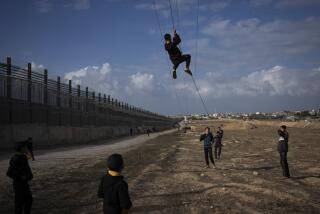Under U.S. Pressure, Syria and Iran Seal Borders With Iraq -- for Now
- Share via
WASHINGTON — After blunt U.S. diplomatic warnings, Iran and Syria have at least temporarily closed their borders with Iraq in moves that could prevent hundreds of Al Qaeda and Ansar al Islam extremists from escaping into Iran and cut off Arab fighters and military equipment arriving from Syria, according to senior U.S. officials.
“We’re having some success on the two most difficult borders,” said a senior administration official who requested anonymity. “We’re hoping it lasts.”
The developments underscored the intense diplomacy required to prevent the war from spiraling into a regional or even more complicated conflict -- and the potential dangers that still lie ahead.
To drive home its message with Iran, U.S. officials in recent weeks have held at least two rounds of secret talks in Europe with Iranian representatives and relayed three “tests” through Swiss diplomats in Tehran, designed to determine whether the Islamic republic intends to use the Iraq war to back away from or draw closer to terrorists, U.S. officials say.
At the top of the list is preventing aid to Al Qaeda and Ansar al Islam fighters. Some may have crossed the wild, mountainous border with Iran, but a State Department official said Thursday that he was “pleasantly surprised” by the Iranian cooperation.
“We asked Iran to play the goalie role, and so far it has blocked most of them from crossing,” said the official, who requested anonymity. “Some of them disappeared for a while but then reappeared in northern Iraq, so the feeling is that Iran is behaving. Now they have to keep it that way.”
The escape of Muslim extremists into Iran, beyond the reach of U.S. forces, would be a setback in the war on terrorism because the northern Iraq enclave was the largest known concentration of Al Qaeda and Ansar al Islam operatives outside Afghanistan. Eliminating their mountain base and rounding up the extremists’ cells have been among the top U.S. goals in Iraq.
Washington has been concerned that Iran may repeat its approach during the recent U.S.-led war in Afghanistan, on the eastern Iranian border, possibly prolonging the need for American troops in the region.
“We don’t want Iran to make the same mistake as it did in Afghanistan, where there was an understanding about going forward in a cooperative way in looking at the future,” said another senior administration official. “They allowed or extracted Al Qaeda from Afghanistan.”
Intense diplomacy by current and former U.S. ambassadors to Damascus with Syrian President Bashar Assad also has led to encouraging signs that his nation has closed the border, again at least temporarily, to passage by Muslim fighters and military equipment to Iraq, U.S. officials said.
The influx of the fighters through Syria could complicate the U.S. military campaign and increase the dangers of terrorist attacks against U.S. troops, the sources said.
Iraqi Vice President Taha Yassin Ramadan said this week that thousands of Arab volunteers had arrived in Iraq, although U.S. officials believe only a small fraction made it across the border. Syrian Foreign Ministry spokeswoman Bouthayna Shaaban said Thursday that volunteers had come from as far as South Africa and Brazil.
“This supports the Syrian argument that this war has to stop because it is only producing anger all over the world,” she said at a media briefing in Damascus.
At any moment, both Iran and Syria could shift course, as both have so often in the past after promising to take action under U.S. pressure.
Defense Secretary Donald H. Rumsfeld said Thursday that Syria was still allowing military shipments into Iraq, although senior U.S. officials later said that large trucks, apparently containing earthmoving equipment, are at the border but have not crossed since Assad promised the U.S. ambassador that Syria would not get involved in Iraq.
Iran also has not addressed two of the three “tests” outlined by the United States in recent weeks. Washington has called on Tehran not to encourage or facilitate extremists from Lebanon, the Palestinian Authority and other parts of the Islamic world to travel to Iraq.
U.S. officials are particularly concerned that Lebanon’s Hezbollah, or Party of God, could be mobilizing forces for Iraq. Dozens of fighters have reportedly made their way from Lebanon to Syria, U.S. officials say.
So far, no fighters have made their way through Iran. Hezbollah also has not used the inflamed passions resulting from the Iraq war to open new attacks across the border into Israel. Both have been noted by Washington as positive signals.
The third “test” is whether Iran will prevent a new influx of Iraqi opposition fighters from the Supreme Council of the Islamic Revolution of Iraq to cross the border from their Iranian bases. One group is already in northern Iraq. The United States is particularly concerned about those fighters crossing into the south.
The Supreme Council, a Shiite Muslim group, is part of the U.S.-backed Iraqi National Congress. Its leadership has visited the United States in recent months, but Washington sees its intervention as a complicating factor that could inflame rival religious tensions.
“We support their goal of regime change, but we want them to stay out of the fighting altogether -- and not add to the chaotic mix,” said the second administration official. “We don’t want to expose U.S. troops to any additional dangers.”
More to Read
Sign up for Essential California
The most important California stories and recommendations in your inbox every morning.
You may occasionally receive promotional content from the Los Angeles Times.













